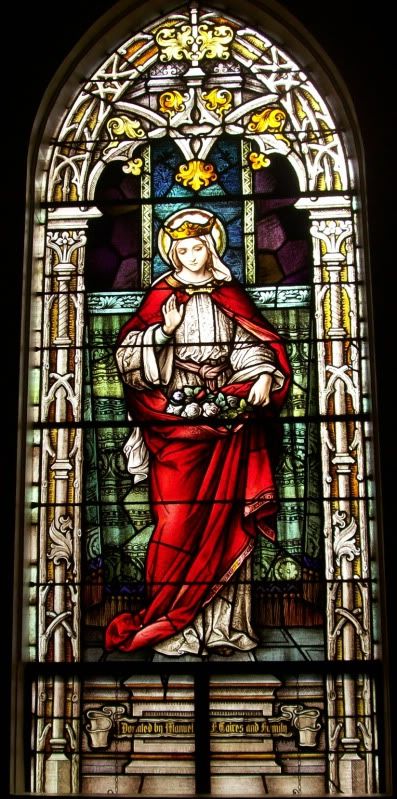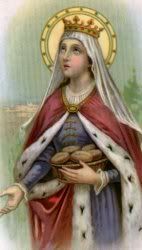Today, July 4, we celebrate the feast day of Saint Elizabeth of Portugal (1271-1336), the “Peacemaker” and Queen of Portugal. Saint Elizabeth’s life is one marked by service to others, quiet obedience, and charitable works. She dedicated her life to her family, brokering peace, and preventing war. Her faith in the Lord filled her every moment and action, and through this faith, she accomplished great things.
Born into royalty in Saragossa, Spain in 1271, the early life of Elizabeth was marked by privilege, but also by grace and piety. The daughter of King Pedro III of Aragon and Queen Constanza, Elizabeth was named for her great aunt, Saint Elizabeth of Hungary. From an early age she was a delightful, obedient, and pious child, well-instructed in the ways of the Christian faith by her mother. At age 12, Elizabeth was betrothed and married to King Denis of Portugal, eight years her senior.
Elizabeth moved to the royal court of Portugal, and found her husband to be a kind, yet immoral man. His court was home to debauchery and immorality, but as a husband, he encouraged her kind works and charity and did nothing to impede her acts of faith. Despite her rigorous political duties, Elizabeth attended Mass on a daily basis, and enacted severe penances such as daily fasting. The couple produced two children, a daughter named Constanza and the eventual crown prince, Alonzo.
During this time, King Denis fathered an additional seven children by a number of other women of the court. Elizabeth endured the infidelity of her husband with patience and humility, never seeking pity, and never demonstrating anger or condemnation. Ever charitable, Elizabeth provided for the education of the king’s illegitimate children, instructing them in the ways of the faith.
Elizabeth's days were filled and guided by her faith. She surrounded herself with religious, every day reciting and singing the Liturgy of the Hours with them. She oversaw the building and institution of a number of charitable organizations throughout Portugal, including a convent to house the Poor Clare nuns, a hospice for the aged poor, hospitals, orphanages, and churches. Actively involved in each project she began, Elizabeth generally designed the buildings being constructed and managed the day-to-day progress of the projects. At times, when money was spare, Elizabeth is said to have paid the construction workers with flowers, which miraculously converted to gold coins at the conclusion of each work day.
A time of great suffering followed for Elizabeth, during which her son, Alonso, led a rebellion against the king. Bitter and jealous of the attention that the king gave to his illegitimate heirs, Alonso garnered support from noblemen and military leaders, starting a war of rebellion. Elizabeth, deeply wounded by the rift between her son and husband, attempted to negotiate peace between them, but only succeeded in finding herself exiled from the royal court by her husband, unjustly accused of crimes she did not commit.
As Elizabeth suffered in exile, she learned of the two men’s opposing armies headed to battle. Astride a horse, she rode onto the battlefield, between the forces, imploring and negotiating temporary peace. For this, she earned the title, “Angel of Peace.” The factious relationship continued until the king’s death, at which time, he converted to the Lord, recognized his sinfulness, and begged forgiveness. He made peace with Elizabeth, clearing her of all charges, and placing her in control of his worldly assets, "having in mind God's Judgment," much of which was bequeathed to churches and religious organizations.
With Elizabeth’s assistance, King Denis called Alfonso to his deathbed, and entrusted Elizabeth to his care: "Look after your mother and my lady, the queen, for she remains alone. Stand by her, as is your duty.... Think that having given you life, and for the many tears you have cost her, she is twice your mother." Alonso, assuming the crown, agreed. Elizabeth tearfully stated, "I have always beseeched our Lord to kindly spare me the bitterness of surviving the king, my lord. I have wished him a long life, for the good and well-being of the people."
Following the death of her husband, Elizabeth gave up the riches and luxury of royalty, clothing herself in the habit of the Poor Clares, and becoming a tertiary attached to the convent she had helped found in Coimbra. She founded a hospital near the convent, and named it after St. Elizabeth of Hungary. Every day, Elizabeth—the Queen of Portugal-- went to work in the hospital, caring for the sick, and choosing for herself the most distasteful tasks in service to the Lord. The Blessed Virgin and Saint Clare are said to have appeared to her in her final days.
Saint Elizabeth died, exhausted from her constant prayer, service, and peace-making, at age 65. Her body remains incorrupt, reposing in the Church of Saint Clare at Coimbra. Her coffin has been opened several times throughout the centuries since she died (as recently as 1912), each time finding her body in sweet repose, exuding the scent of holiness.
The life of Saint Elizabeth demonstrates to us the importance of faith and attendance at Mass. Only through her devotion to the Lord, was she able to withstand the onslaughts of the world—including separation from her family, false accusations levied against her, betrayal, abuse, and hardship. Despite these struggles, Elizabeth led a life of patient sanctity, working tirelessly to create a social welfare network throughout Portugal, never forgetting the sick, elderly, orphaned, and in need. We pray for the intercession of Saint Elizabeth of Portugal, that we, too, may find the faith in our lives to become peacemakers for Christ.
Father of peace and love,
you gave St. Elizabeth the gift of reconciling enemies.
By the help of her prayers
give us the courage to work for peace among men,
that we may be called the sons of God.
We ask this through our Lord Jesus Christ, Your Son,
who lives and reigns with you and the Holy Spirit,
one God, for ever and ever. Amen.
Inspired by the origins and spiritual history of the Holy Rosary, we continue our meditation on the psalms, one each day, in order, for 150 days.
Today’s Psalm: Psalm 70: The Lord, Our Deliverer
1 Hasten, O God, to save me;
O LORD, come quickly to help me.
2 May those who seek my life
be put to shame and confusion;
may all who desire my ruin
be turned back in disgrace.
3 May those who say to me, "Aha! Aha!"
turn back because of their shame.
4 But may all who seek you
rejoice and be glad in you;
may those who love your salvation always say,
"Let God be exalted!"
5 Yet I am poor and needy;
come quickly to me, O God.
You are my help and my deliverer;
O LORD, do not delay.
Day 185 of 365
Prayer Intentions: Hearts of charity, patience, and endurance; Peace throughout the world.
Requested Intentions: Employment; Discernment of God’s will (A); Healing of illness (P); Small business assistance, blessings on jobs, financial aid for college student (M); Financial assistance (F); For a recovery and sanctification (X); For a daughter struggling with disease and illness (T); For all lost children (I); Prosperity, health, healing, and conversion for a family (M); Health and healing of a mother (A); Healing of heart and mind (T); Healing of a new relationship before marriage (K); Healing of a relationship (T); Eternal rest for the dearly departed, end to financial struggles, successful sale of home, ability to travel on pilgrimage (L); For healing of a stomach illness (L); For the repose of the soul of a sister (C); Vocational security for family, Financial security for daughter beginning college (M); Vocational guidance, courage and strength (I); Health for an ailing nephew (A); Those suffering from depression (J); Successful adoption (S); Healing of a father battling cancer (S).
Psalm: Psalm 70: The Lord, Our Deliverer
Why pray the Rosary every day for a year?
Each time the Blessed Virgin has appeared-- whether it be to Saint Bernadette Soubirous at Lourdes; to Lucia, Jacinta, and Francisco at Fatima; or to Mariette Beco at Banneux-- she has asserted the importance, saving grace, and power of praying the Holy Rosary on a daily basis. Based upon her words, the Rosary is penance and conversion for sinners, a pathway to peace, an end to war, and a powerful act of faith in Jesus Christ. Pope Paul VI presented the Rosary as a powerful means to reach Christ "not merely with Mary but indeed, insofar as this is possible to us, in the same way as Mary, who is certainly the one who thought about Him more than anyone else has ever done."
To show us how this is done, perhaps no one has been more eloquent than the great Cardinal Newman, who wrote: "The great power of the Rosary consists in the fact that it translates the Creed into Prayer. Of course, the Creed is already in a certain sense a prayer and a great act of homage towards God, but the Rosary brings us to meditate again on the great truth of His life and death, and brings this truth close to our hearts. Even Christians, although they know God, usually fear rather than love Him. The strength of the Rosary lies in the particular manner in which it considers these mysteries, since all our thinking about Christ is intertwined with the thought of His Mother, in the relations between Mother and Son; the Holy Family is presented to us, the home in which God lived His infinite love."
As Mary said at Fatima, "Jesus wants to use you to make Me known and loved. He wishes to establish the devotion to My Immaculate Heart throughout the world. I promise salvation to whoever embraces it; these souls will be dear to God, like flowers put by Me to adorn his throne."

Subscribe to:
Post Comments (Atom)

















0 comments:
Post a Comment
Thanks for leaving a comment. If you wish to submit a prayer request, however, please do so above, using the "Contact" tab.